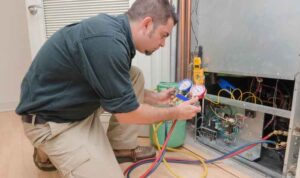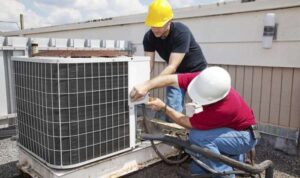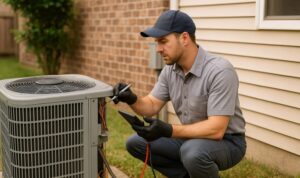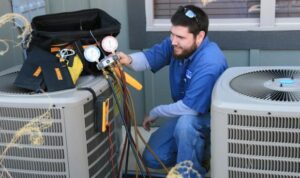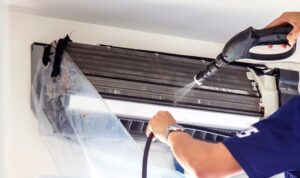Exploring the realm of AC preventive maintenance unveils a world where efficiency, cost savings, and system longevity intertwine. This crucial practice not only prevents sudden breakdowns but also guarantees uninterrupted cooling, creating a harmonious environment for all.
As we delve deeper into the components, frequency, and DIY versus professional aspects of AC preventive maintenance, a clearer picture emerges of the meticulous care required to keep our systems running smoothly.
Importance of AC Preventive Maintenance
Regular preventive maintenance for air conditioning systems is crucial to ensure optimal performance and longevity. By conducting routine maintenance checks, you can prevent potential issues before they escalate, saving you both time and money in the long run.
Benefits of Regular Maintenance
- Improved Efficiency: Regular maintenance helps keep your AC unit running efficiently, reducing energy consumption and lowering your utility bills.
- Cost Savings: By addressing minor issues early on, you can avoid costly repairs or replacements down the line.
- Extended Longevity: Proper maintenance extends the lifespan of your air conditioner, ensuring it operates smoothly for years to come.
Preventing Sudden Breakdowns
Regular maintenance checks help identify and address any potential problems before they lead to a sudden breakdown. This proactive approach ensures that your air conditioner operates smoothly without any unexpected interruptions, providing you with uninterrupted cooling during hot summer days.
Components of AC Preventive Maintenance
Regular inspection and servicing of key components in an AC system are essential to ensure optimal performance and longevity of the unit.
Cleaning Filters
Regularly cleaning or replacing air filters is crucial to maintain good indoor air quality and prevent the AC system from overworking, leading to energy efficiency and cost savings.
Checking Refrigerant Levels
Monitoring and maintaining proper refrigerant levels is important to ensure the AC system operates efficiently and effectively, preventing potential breakdowns and costly repairs.
Inspecting Electrical Connections
Checking electrical connections for any signs of wear or damage is vital to prevent electrical issues and ensure the safe operation of the AC unit.
Coil Maintenance
Regular cleaning and inspection of evaporator and condenser coils help maintain proper heat transfer, preventing the system from working harder than necessary and reducing energy consumption.
Ductwork Inspection
Inspecting ductwork for leaks or blockages is crucial to ensure proper airflow and distribution of cooled air throughout the space, improving overall comfort and efficiency.
Frequency and Schedule of AC Preventive Maintenance
Regular preventive maintenance is crucial to ensure the efficiency and longevity of your AC system. Here, we will discuss how often maintenance should be performed, seasonal considerations, optimal times for checks, and tips for creating a maintenance schedule.
Frequency of Maintenance
- It is recommended to conduct preventive maintenance on your AC system at least once a year.
- For commercial or heavily used systems, bi-annual maintenance may be necessary to keep the system running smoothly.
Seasonal Considerations
- Spring and fall are optimal times for AC maintenance to prepare for the upcoming seasons of heavy use.
- During spring, the system can be checked and cleaned after the winter months of inactivity.
- Similarly, fall maintenance ensures the system is ready for the increased workload during the summer months.
Creating a Maintenance Schedule
- Consider the usage patterns of your AC system. If it runs constantly, more frequent maintenance may be required.
- Climate conditions also play a role in determining the frequency of maintenance. Hot and humid climates may require more frequent checks.
- Keep a record of past maintenance dates and observations to help plan future maintenance schedules effectively.
DIY vs. Professional AC Maintenance
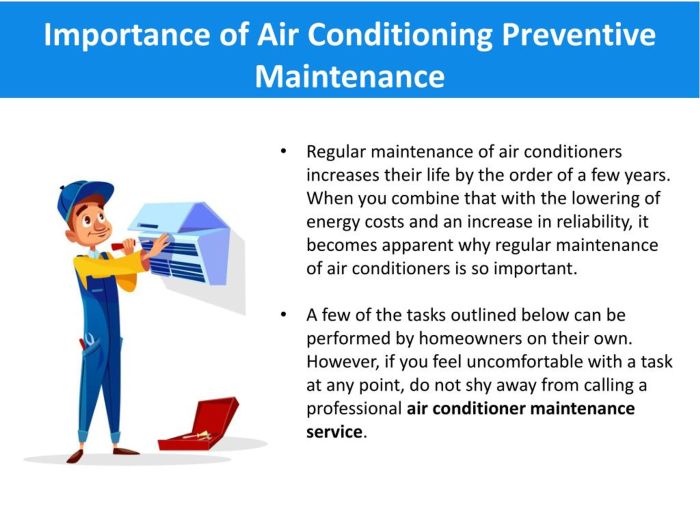
When it comes to AC maintenance, homeowners often face the decision of whether to handle it themselves or hire a professional service. Both DIY maintenance and professional maintenance have their own set of advantages and disadvantages, so it's important to weigh the options carefully before making a decision.
Advantages and Disadvantages
- DIY Maintenance:One of the main advantages of DIY maintenance is cost savings. Homeowners can save money by performing routine maintenance tasks themselves, such as cleaning or changing filters. However, the downside is that DIY maintenance may not always be thorough, leading to potential issues being overlooked.
- Professional Maintenance:Hiring a professional service ensures that the maintenance is done correctly and thoroughly. Professionals have the expertise and tools to identify any potential problems and address them before they worsen. The main disadvantage is the cost, as professional maintenance can be more expensive than doing it yourself.
When to Opt for Professional Maintenance
- It is best to opt for professional maintenance when dealing with complex issues or if you are unsure of how to properly maintain your AC system. Professionals can provide a comprehensive inspection and maintenance plan tailored to your specific needs.
- Additionally, if your AC system is still under warranty, it may require professional maintenance to keep the warranty valid. Failure to adhere to manufacturer recommendations could void the warranty.
Risks of Improper Maintenance and Benefits of Professional Expertise
- Improper maintenance practices, such as neglecting to clean or replace filters, can lead to reduced efficiency and increased energy bills. It can also result in more frequent breakdowns and costly repairs in the long run.
- Professional expertise ensures that your AC system is properly maintained, prolonging its lifespan and maximizing its efficiency. Professionals can also catch potential issues early on, preventing major breakdowns and saving you money in the long term.
Closing Notes
In conclusion, AC preventive maintenance stands as a pillar of reliability, with its benefits echoing through the realms of efficiency and longevity. By understanding the intricacies of maintenance components and schedules, one can embark on a journey towards a cooler, more sustainable future.
Popular Questions
How often should AC preventive maintenance be done?
It is recommended to perform preventive maintenance at least twice a year to ensure optimal performance.
What are the risks of DIY maintenance?
DIY maintenance can lead to improper handling of components, void warranties, and even cause more harm than good if not done correctly.
Why is inspecting electrical connections important?
Inspecting electrical connections is crucial as loose connections can lead to system failures or even pose a fire hazard.

